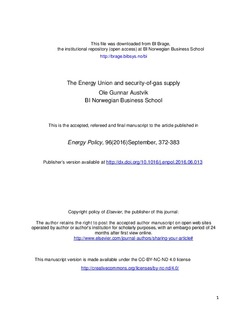The Energy Union and security-of-gas supply
Journal article, Peer reviewed
Permanent lenke
http://hdl.handle.net/11250/2421517Utgivelsesdato
2016Metadata
Vis full innførselSamlinger
- Scientific articles [2181]
Originalversjon
Energy Policy, 96(2016)September, 372-382 http://dx.doi.org/10.1016/j.enpol.2016.06.013Sammendrag
This paper discusses and contrasts the proposals for an Energy Union in the European Union and its impact on security-of-gas-supply. Based on an examination of historical East-West gas trade and by revisiting energy security concepts, the paper analyzes how problems with dependency on energy imports can be reduced. The paper discusses how the positions of Central and Eastern European countries (CEEC), where security challenges are especially evident, and the positions of countries in Western Europe, where they are less acute, interact and conflicts in making a common energy security policy as part of the Energy Union. The paper argues that the mainly confederative structure of the EU, and diverging national situations, make it difficult to unify positions into an effective common energy policy. However, with the CEEC in the EU, the EU is also changing, and an increased focus on energy security may be accepted. Extended interconnectedness within and to the CEEC appears to be the central issue that would mitigate, albeit not solve, contemporary security-of-gas-supply problems. As it would also bring the internal energy market closer to reality, it could in addition help the Energy Union to become a unifying project merging the interests in the East and the West despite their different security-of-gas supply concerns with Russian gas.
Beskrivelse
This is the accepted, refereed and final manuscript to the article
